http://www.wiwo.de/politik-weltwirtschaft/...n-gegen-den-euro-421902/
Zocken gegen den Euro
 Werbung
Werbung
Passende Knock-Outs auf Gold
| Strategie | Hebel | |||
| Steigender Gold-Kurs | 5,00 | 9,98 | 14,97 | |
| Fallender Gold-Kurs | 6,16 | 9,95 | 15,01 | |
Zugriffe: 18.923 / Heute: 1
|
http://www.wiwo.de/politik-weltwirtschaft/...n-gegen-den-euro-421902/

Der Euro ist technisch zwar angeschlagen. Doch die Spekulanten sollten aufpassen: Wenn sich zu viele im Boot auf die gleiche Seite neigen, kippt das Boot um.
Noch gefährlicher für die Spekulanten wird die Sache durch einen weitverbreiteten Irrglauben: Wenn die US-Fed den Leitzins erhöht, muss der US-Dollar steigen. Die beiden letzten größeren Beginne von US-Zinserhöhungszyklen datieren vom Juni 2004 sowie vom Januar 1994. Dazwischen lag ein kleinerer Zinserhöhungzyklus, der im August 1999 begann. Der folgende Chart zeigt diese Daten (siehe rote Pfeile).

Man beachtete, dass der Euro/Dollar in allen drei Fällen zunächst positiv reagierte. Das entspricht nicht der gängigen Erwartungshaltung. Die Erklärung ist die, dass bereits im Vorfeld – wie jetzt auch – auf eine Zinserhöhung spekuliert wird und damit der Trade praktisch vorweggenommen wird. Kommt die Zinserhöhung dann tatsächlich, geht es in die andere Richtung.
Übertragen auf den Euro/Dollar bedeutet dies, dass es nur noch eine Frage der Zeit ist, bis der Druck auf den Euro nachlässt. Man müsste jetzt darüber spekulieren, ob bereits die wahrscheinliche Erhöhung des US-Diskontsatzes Mitte März eine zumindest temporäre Rallye im Euro auslösen kann. Hinzu kommt, dass der handelsgewichtete US-Dollar-Index über ein Widerstandscluster im Bereich von 80 Punkten verfügt (rote Linie folgender Chart).

Fazit: Die Spekulation gegen den Euro hat bereits jetzt Ausmaße angenommen, die beinahe alles bisher Dagewesene in den Schatten stellt. Man hat das Gefühl, dass einige US-amerikanische Hedge-Fonds-Manager mit der Lupe Griechenland und Portugal auf dem Globus suchen, um mit diesen Ländern „Schiffe versenken“ spielen zu können.
Dabei vergessen sie, dass die Verschuldung ihres eigenen Staates die Durchschnittsverschuldung Europas übertrifft: Wer im Glashaus sitzt, sollte nicht mit Steinen werfen. Angesichts der bereits überbordenden Spekulation halten wir einen „Snap-Back“ des Euro mehr und mehr für wahrscheinlich. Allerdings sollte für einen Trade erst eine charttechnische Bestätigung in Form einer Umkehrformation abgewartet werden.
weiter hier:
www.mmnews.de/index.php/201002174945/MM-News/...angriff-auf-Euro.html
sondern abschreckendes Beispiel des anglo-amerikanischen Finanzfaschismus,
denn er verletzt die Grundsätze ordnungsgemäßer Buchführung.
sondern abschreckendes Beispiel des anglo-amerikanischen Finanzfaschismus,
denn er verletzt die Grundsätze ordnungsgemäßer Buchführung.
PS: Und das um die Uhrzeit !!

[FED RAISES DISCOUNT RATE] The Fed has raised its Discount Rate by 25 BPs to 0.75% from 0.50%, effective Feb 19. It also has raised the minimum bid rate for TAF loans to 0.5%. It has shortened the typical maximum maturity for primary credit loans to overnight, effective Mar 18. The Fed says that the move is not a signal of any change in outlook for the economy or monetary policy. The outlook for the economy and policy remains about as it was at the Jan FOMC meeting. Rather the move is intended as a further normalization of lending facilities and is not expected to lead to tighter financial conditions for households or businesses 21:06 GMT - [NORTH AMERICAN FX CLOSE] Eur/Usd once again stalled on the downside, but a long Usd market and widely touted barrier defence are combining to fend off (what many see as an eventual) break below 1.3500. US data was mixed, as weekly claims was said to be adversely impacted by the heavy snow- storms while Philly Fed index and LEI better. See page .
sondern abschreckendes Beispiel des anglo-amerikanischen Finanzfaschismus,
denn er verletzt die Grundsätze ordnungsgemäßer Buchführung.
Bei berechtigten Einwänden email an be@schwer.de
Last year’s parabolic rallies in copper, gold, Brazilian and Russian stocks, and the Australian dollar, are running out of steam. Suddenly, there are eerie reminiscences of scarier days gone-by. Volatility has returned to the money markets, amid worries about a possible “double-dip” recession for the world economy, capital flight from European sovereign debt markets, monetary tightening in Australia, China, and India, and the President Obama’s backing for the “Volcker rule,” – which calls for a clamp-down on the speculative trading binges of the Wall Street Oligarchs.
As fate would have it, on February 6th, many of the world’s top central bankers were huddling in Sydney, Australia, for two-days of secret talks. European Central Bank chief Jean-Claude Trichet, New York Fed chief William Dudley, the governor of the People’s Bank of China, Zhou Xiaochuan, and the Bank of New Zealand’s Alan Bollard were all in attendance, while global commodity and stock markets were skidding lower, in their first significant correction since last June.
Spooked by fears that Greece or Dubai World would default on their debt repayments, Australia’s ASX-200 Index fell below the 4,500-level, losing 10%, of its value in three-weeks, due to rapid unwinding of Aussie /yen carry trades. There were equally sharp downdrafts on Wall Street, the Nikkei-225 Index in Tokyo, and the Hang Seng index crashed below the psychological 20,000-mark. Sovereign debt fears hammered the Australian dollar to 78-yen from above 85-yen a few weeks earlier. It began to feel like 2007-08 all over again.
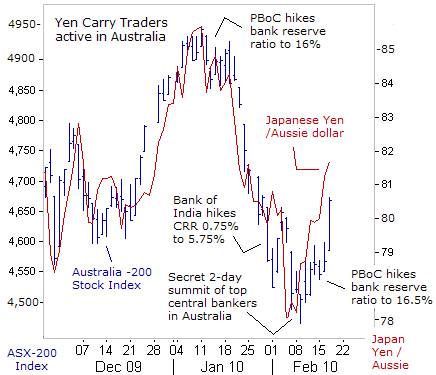 ECB chief “Tricky” Trichet didn’t have a chance to sip champagne or dine with his G-20 cohorts. Instead, he was flying back to Brussels to attend an emergency meeting. The worst of the global carnage hit the stock markets of Greece, Portugal, and Spain, three heavily indebted Euro-zone countries whose ability to re-pay lenders, including $331-billion owed to German banks, $307-billion owed to French banks, and $156-billion owed to British banks was in doubt. Swiss banks hold 47-billion Euros of Greek debt, equal to 12% of Swiss GDP. Furthermore, there’s an outer ring of fire surrounding Club-Med that could spread to Eastern Europe.
ECB chief “Tricky” Trichet didn’t have a chance to sip champagne or dine with his G-20 cohorts. Instead, he was flying back to Brussels to attend an emergency meeting. The worst of the global carnage hit the stock markets of Greece, Portugal, and Spain, three heavily indebted Euro-zone countries whose ability to re-pay lenders, including $331-billion owed to German banks, $307-billion owed to French banks, and $156-billion owed to British banks was in doubt. Swiss banks hold 47-billion Euros of Greek debt, equal to 12% of Swiss GDP. Furthermore, there’s an outer ring of fire surrounding Club-Med that could spread to Eastern Europe.
Greece is the weakest link in the Euro-regime, and it’s in the eye of the storm, owing 300-billion Euros of outstanding debt. Athens doesn’t have an independent central bank that can simply print drachmas to pay-off its debts, so without a bailout from its wealthier neighbors, it could default on €50-billion ($72-billion) of debt coming due this year. But given the enormous amount of loans extended to Club Med from German and French banks in particular, Athens is betting that German Chancellor Angela Merkel and French President Nicolas Sarkozy have little choice, but to pay the tab for Greece’s flamboyant spending.
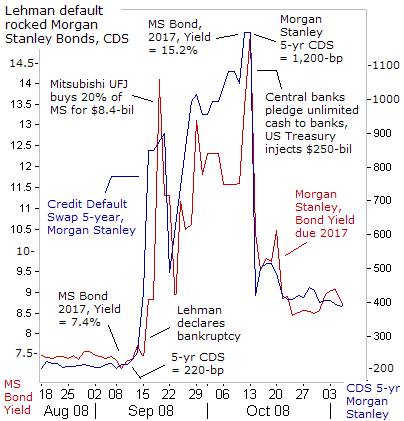
The size of Greece’s debt is roughly equal to that of fallen Lehman Brothers, whose bankruptcy in Sept 2008, ignited the explosion of $400-billion of credit default swaps (CDS), linked to its debt, and nearly led to the collapse of Wall Street titan Morgan Stanley. At the height of the panic, CDS rates on Morgan Stanley’s debt soared to 1,200-basis points, and MS’s bonds fell to 50-cents on the dollar. Thus, European leaders are keen to prevent a replay, this time with Greece’s budget woes spreading to Portugal or Spain, which in turn, could reverberate around the globe.
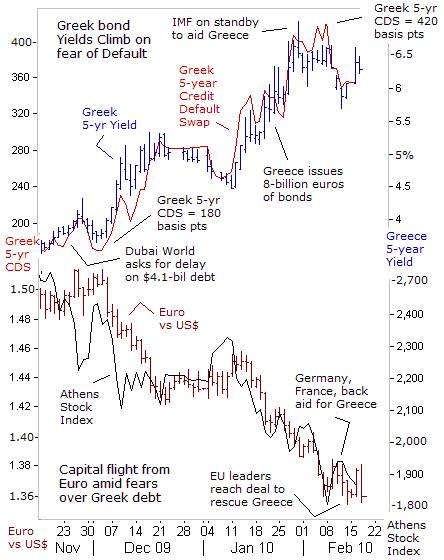 “Euro-area member states will take determined and coordinated action, if needed, to safeguard financial stability in the Euro area as a whole,” warned EU President Herman Van Rompuy on Feb 11th. “Greece won’t be left alone, but there are rules that must be adhered to. On this basis we will agree on a statement,” Germany’s Merkel added. “The International Monetary Fund stands ready to help Greece with its debt crisis,” said IMF chief John Lipsky on Jan 30th.
“Euro-area member states will take determined and coordinated action, if needed, to safeguard financial stability in the Euro area as a whole,” warned EU President Herman Van Rompuy on Feb 11th. “Greece won’t be left alone, but there are rules that must be adhered to. On this basis we will agree on a statement,” Germany’s Merkel added. “The International Monetary Fund stands ready to help Greece with its debt crisis,” said IMF chief John Lipsky on Jan 30th.
The CDS market is a hotbed of speculation, where bankers and hedge funds, can bet on the price of contracts, without transparency, and without actually holding the underlying bonds. By whipping-up hysteria of a looming sovereign default in the media, and driving-up the cost of insuring debt in the CDS market, speculators can weaken confidence in a government bond market, and drive-up interest rates.
“This is an attack on the Euro-zone by certain interests, - political or financial, - and often countries are being used as the weak link of the Euro zone,” said Greek Prime Minister George Papandreou at the World Economic Forum in Davos on Jan 28th. “We are being targeted, particularly with an ulterior motive or agenda, and of course, there is speculation in the world markets,” he said.
Through the rigging of the opaque CDS market, speculators were able to conjure-up fears of a Greek default on its debt, while aiming to profit from short sale positions in Greek bonds or equities. Traders also profited by short selling the Euro against the Australian dollar and the Brazilian real. Since Dubai World requested a moratorium on $4.1-billion of debt payments on Nov 28th, the Euro has also fallen 10% against the pitiful US-dollar, sinking to a low of $1.3580 on Feb 17th.
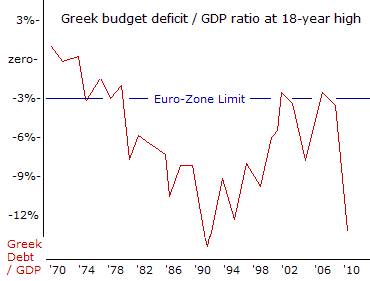
Under the weight of rising interest rates, the Athens stock exchange index lost a quarter of its value over the past three-months. Hard times lie ahead for Greece, with EU heads of state and parliaments calling for harsh austerity measures in return for bailout money. Greek President George Papandreou has been forced to call for across-the-board freeze on Greece’s public sector wages along with a cut in allowances, which amounts to a wage cut of 4-percent. He’s also called for pension reform, which entails raising the retirement age, as well as higher fuel taxes.
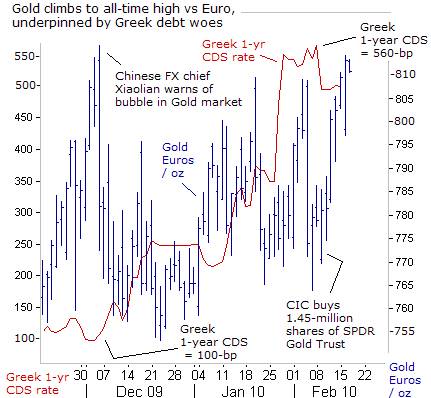 But Greece’s largest labor unions, which equal half of the country’s 5-million-strong workforce, are joining forces for a strike to protest cuts to their wages. Although Germany’s deputy finance minister says Greece should mimic Ireland and Latvia, and slash spending and wages savagely, at the end-of-the-day, Bonn and Paris must deliver the bailout money to protect the interests of their largest banks, and avoid the systemic risk posed to the entire European monetary union.
But Greece’s largest labor unions, which equal half of the country’s 5-million-strong workforce, are joining forces for a strike to protest cuts to their wages. Although Germany’s deputy finance minister says Greece should mimic Ireland and Latvia, and slash spending and wages savagely, at the end-of-the-day, Bonn and Paris must deliver the bailout money to protect the interests of their largest banks, and avoid the systemic risk posed to the entire European monetary union.
While, Greece, Portugal, Ireland, and Spain are the most vulnerable, even Germany, the Euro-zone’s locomotive, has a public debt expected to reach 90% of GDP this year, and a budget deficit expected to reach 6% of GDP in 2010 -- figures that put Berlin in non-compliance with the stability pact. All that’s left to be worked out are some cosmetic concessions to be offered by Greece, to make the cost of financing its bailout more palatable to its resentful Euro-zone neighbors.
With the Euro sliding against all currencies, amid capital flight from Euro-zone bonds, traders turned to gold as a safe haven from a potential banking or currency crisis. There are also signals that an outbreak of inflation in the Euro-zone is looming on the horizon. For gold bugs, the most electrifying bolts of energy were reports that the China Investment Corp (CIC), the trading arm of Beijing’s $300-billion sovereign wealth fund, recently bought 1.45-million SPDR Gold Trust shares (NYSE: GLD), or 0.4% of the total shares outstanding, for a cash outlay of $155-million.
Traders also learned that Beijing dumped $34-billion of US-Treasuries in December, trimming its total holdings down to $755-billion. China is now the second-biggest holder of US Treasuries, after Japan, a sign the Chinese Politburo is alarmed by America’s out-of-control fiscal policy. Looming over the debt crisis in Europe is the far greater crisis of the world’s biggest debtor, - the United States.
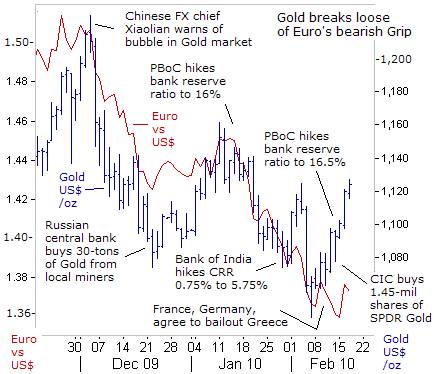 President Obama’s latest budget projects a shortfall of $1.6-trillion, equivalent to 11.4% of GDP, the highest since the end of World War II. This approaches Greece’s deficit ratio of 12.7% of GDP, and the UK’s 13.3% deficit, while the US budget, moreover, projects trillion-dollar deficits for years to come. Washington responded to the financial crash of 2008, by essentially bankrupting the Treasury, and the country, in order to preserve the wealth of Wall Street’s financial elite.
President Obama’s latest budget projects a shortfall of $1.6-trillion, equivalent to 11.4% of GDP, the highest since the end of World War II. This approaches Greece’s deficit ratio of 12.7% of GDP, and the UK’s 13.3% deficit, while the US budget, moreover, projects trillion-dollar deficits for years to come. Washington responded to the financial crash of 2008, by essentially bankrupting the Treasury, and the country, in order to preserve the wealth of Wall Street’s financial elite.
China’s investment in the Spider Gold Trust (GLD), was timed after a 15% correction in the spot gold price, to below $1,100 /oz. Interestingly enough, on Dec 2nd, Hu Xiaolian, the PBoC’s currency chief, warned speculators that Gold prices were too high at $1,225 /oz and said traders should be careful of a bubble bursting. “We must keep in mind the long-term effects when considering how to use as our reserves. We must watch out for bubbles forming, and be careful in those areas.”
Xiaolian’s comments coincided with a peak in gold prices at $1,225 /oz, before panic selling set-in the following day, when the US Labor department reported much better than expected employment figures, sending US Treasury yields 50-basis points higher. The PBoC itself triggered a second wave of selling in gold, when it hiked its bank reserve ratio for its largest banks to 16%, aiming to slow its M2 money supply growth rate from 29.5% last October, to 18% in the year ahead.
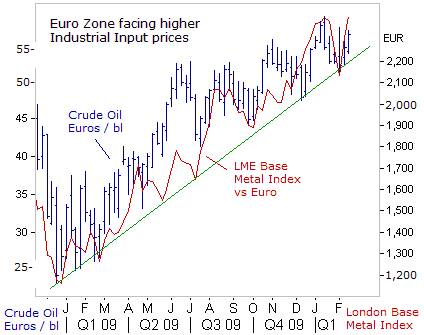 After shaking the speculative froth off the gold market, Beijing began buying GLD for its strategic reserves. Beijing is also buying gold quietly from its local miners. But a second hike in the PBoC’s reserve ratio to 16.5% on Feb 12th, failed to put a lasting dent in the gold market, as traders reckoned that the Greek tragedy would further delay the ECB’s plans to exit from its ultra-easy money policies. As a result, gold was able to break the bearish grip of a declining Euro and stronger US-dollar.
After shaking the speculative froth off the gold market, Beijing began buying GLD for its strategic reserves. Beijing is also buying gold quietly from its local miners. But a second hike in the PBoC’s reserve ratio to 16.5% on Feb 12th, failed to put a lasting dent in the gold market, as traders reckoned that the Greek tragedy would further delay the ECB’s plans to exit from its ultra-easy money policies. As a result, gold was able to break the bearish grip of a declining Euro and stronger US-dollar.
CIC, whose chairman is the former Communist Party of China insider Lou Jiwei, has been quietly accumulating stakes in natural resource companies, including Canada’s Kinross Gold, Teck Resources, Potash of Saskatchewan, Brazilian iron ore and nickel giant Vale, Euro-zone steel producer ArcelorMittal, and other mining and energy related companies, such as US-natural gas producer Chesapeake Energy, the US Securities and Exchange Commission has revealed.
A surprise move by Beijing to revalue the yuan by 5% or more this year would provide Chinese importers with greater purchasing power of industrial commodities, helping to keep raw material prices high. This is creating a headache for the ECB, since a weaker Euro is pushing-up the cost of imported crude oil, and key metals, such as copper, nickel, platinum, and zinc, used in manufacturing. And historical price charts show a close correlation between the year-over-year change in commodity markets, and the Euro-zone’s Producer Price Index.
A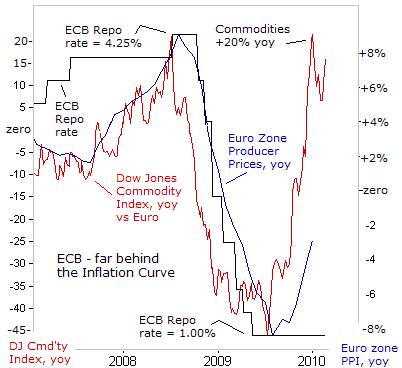 serious outbreak of inflation lies ahead for the Euro zone, especially for imported goods, due to the devaluation of the Euro, and the upward surge in the Dow Jones Commodity Index, now running +16% higher than a year ago. After a series of rapid-fire rate cuts to a record low of 1%, the ECB now finds itself far behind the “Inflation Curve,” but can’t tighten its monetary policy, in reaction to the upward surge in commodities markets, as it did in the past.
serious outbreak of inflation lies ahead for the Euro zone, especially for imported goods, due to the devaluation of the Euro, and the upward surge in the Dow Jones Commodity Index, now running +16% higher than a year ago. After a series of rapid-fire rate cuts to a record low of 1%, the ECB now finds itself far behind the “Inflation Curve,” but can’t tighten its monetary policy, in reaction to the upward surge in commodities markets, as it did in the past.
Instead, the ECB’s hands are tied by the Greek tragedy, and instead, must rely on government apparatchiks at EuroStat, to fudge (mute) the official inflation numbers, in order to buy precious time, for its ultra-easy money policy. However, the surge in global commodity inflation has already swept across the English Channel. British consumer price inflation surged to +3.5% in January, far above the Bank of England’s 2% target in January, forcing BoE chief Mervyn King to write a public letter of apology, for the insidious side-effects of QE.
Soon, even the apparatchiks at EuroStat would be forced to admit that the PPI is turning sharply higher. In turn, sentiment towards Euro-zone bonds could sour further, amid a steady erosion of the Euro on global currency markets. ECB officials would argue that a 10% jobless rate, and vast amounts of unused capacity in the economy, will contain inflationary pressures, but such arguments are starting to fall on deaf ears, as Asian demand buoys global commodity markets.
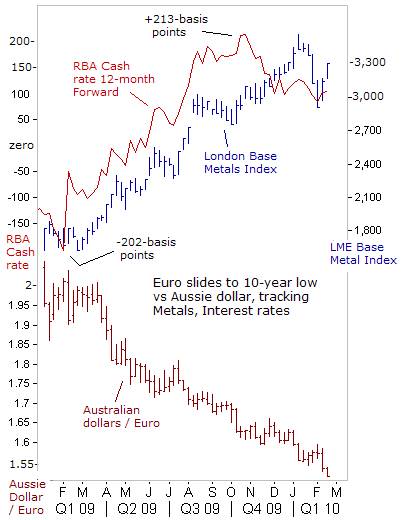 Former Bundesbank hawk Otmar Issing has warned on Feb 15th, that bailing out Greece would deal a “major blow” to the Euro’s credibility. “The viability of the whole framework -- nothing less -- is at stake. Financial assistance for countries that violated the terms of their participation in EMU would be a major blow for the credibility of the whole framework. Such principles do not allow for compromise. Once Greece is helped, the dam would be broken. The question is whether monetary union can survive,” said Issing.
Former Bundesbank hawk Otmar Issing has warned on Feb 15th, that bailing out Greece would deal a “major blow” to the Euro’s credibility. “The viability of the whole framework -- nothing less -- is at stake. Financial assistance for countries that violated the terms of their participation in EMU would be a major blow for the credibility of the whole framework. Such principles do not allow for compromise. Once Greece is helped, the dam would be broken. The question is whether monetary union can survive,” said Issing.
Nerve wracked Euro investors are scanning their radar screens, and have found a safe haven from the Greek debt bomb. The Euro has slipped to a new 10-year low against the Aussie dollar, after losing a quarter of its market value from a year ago. Carry traders are having a field day, borrowing vast quantities of Euros at 1%, and lending in Aussie dollars at 3.75%, or Brazilian reals at a higher interest rate of 8.75%, while pocketing huge profits from the “commodity currency” gains.
There’s a good chance the interest rate spread between the commodity currencies and the Euro will widen further, after the Australian jobless rate fell to an 11-month low of 5.3%, and Australian employers added 194,600 jobs over the past five-months. In recent days, the central banks of Australia and Brazil have stated that the task of moderating inflation would require gradual rates hikes. In Sydney, the 12-month forward market is pricing in 100-basis points of RBA’s rate hikes to 4.75%, and in Sao Paulo, Brazil, traders are predicting 150-basis points of tightening in the overnight Selic rate to 10.25-percent.
In the case of Australia and Brazil, their economies are linked to surging Chinese demand for commodities, especially coking coal, crude oil, and iron-ore. If the ECB doesn’t act to defend its currency soon, by draining liquidity, the Euro could become the top “carry trade” currency, usurping the US-dollar for short selling strategies. Minutes of the Fed’s meeting in January indicated that several Fed officials want to start draining the US$ liquidity swamp, by selling mortgage backed bonds, sooner rather than later. If correct, the US-dollar could move higher, and Euro would fall further (below US$1.35). In a deleterious cycle, the Euro-zone economy would stumble into the dreaded trap of “Stagflation.”
This article is just the Tip of the Iceberg of what’s available in the Global Money Trends newsletter. Subscribe to the Global Money Trends newsletter, for insightful analysis and predictions of (1) top stock markets around the world, (2) Commodities such as crude oil, copper, gold, silver, and grains, (3) Foreign currencies (4) Libor interest rates and global bond markets (5) Central banker "Jawboning" and Intervention techniques that move markets.
By Gary Dorsch,
Editor, Global Money Trends newsletter
http://www.sirchartsalot.com
www.marketoracle.co.uk/Article17333.html
http://www.marketoracle.co.uk/
Veranstaltet wurde das "Ideen-Dinner" laut der Zeitung von dem Investment- und Brokerhaus Monness, Crespi, Hardt & Co. Anwesend soll auch David Einhorn, Gründer von Greenlight Capital, gewesen sein. Einhorn war einer der pointiertesten Kritiker der Investmentbank Lehman Brothers, die im September 2008 zusammenbrach.
Wortführer an dem Abend soll SAC-Capital-Manager Aaron Cowen gewesen sein. Er soll sämtliche Lösungsansätze für das Griechenland-Problem als negativ für den Euro eingeschätzt haben, hieß es aus Teilnehmerkreisen. Die Handelsposition von SAC ist nicht bekannt. Hedge-Fonds-Legende George Soros, selbst wohl nicht anwesend, äußerte sich mehrmals öffentlich kritisch zur Aussicht für die Währungsunion. Er sagte, es bestehe die Gefahr, dass die Euro-Zone zusammenbreche.
Das Treffen fällt zeitlich mit einem rapiden Anstieg der Euro-Nettoverkaufspositionen an den Terminmärkten zusammen. Just in dieser Woche kletterte Anzahl der Kontrakte, mit der Händler an der Chicago Mercantile Exchange (CME) auf einen Kursverfall des Euro wetteten, auf 60.000. Das sei der höchste Wert seit Einführung der Gemeinschaftswährung, schrieben die Währungsstrategen von Morgan Stanley in einem Researchbericht. Drei Tage nach dem Dinner-Termin fiel der Euro unter die Marke von 1,36 $.
www.ftd.de/finanzen/maerkte/...-euro-attacke-aus/50080875.html
auf die Nase bekommen :-) KLASSE

Die Spekulationen sind ein Totentanz - so wie das gleichnamige Gemälde des österreichischen Malers Egger-Lienz
26. Februar 2010 Einige der weltgrößten Hedge-Fonds haben eine Kampagne gegen Euro und britisches Pfund begonnen. Auf verschwiegenen Treffen hinter den Kulissen, aber auch mit öffentlichen Aufrufen trommeln die Fonds zugunsten ihrer Spekulationen gegen die beiden Währungen.
In London hat der ehemalige Partner von George Soros, Jim Rogers, gemeinsam mit den Spekulanten Marc Faber und Vince Stanzione Investoren zu einem Seminar am 19. März eingeladen, denn „aus der jetzigen Situation könnte viel Kapital geschlagen werden“. Investoren könnten die Geheimnisse der Insider kennenlernen, die mit ihren Strategien schon oft recht gehabt hätten, lautet ihre Werbung. In dem Aufruf schüren Rogers und seine Mitstreiter Panik: „Ende des Jahres wird die wirklich schwere Rezession beginnen mit Zusammenbrüchen wie Lehman Brothers und Chaos, bis sich das Gewitter bereinigt hat.“ Rogers hatte 1973 mit George Soros den Quantum Fonds gegründet. Soros wurde im Jahr 1992 berühmt, als er gegen die britische Währung spekulierte, das Pfund schließlich das Europäische Wechselkurssystem (EWS) verlassen und abwerten musste. Soros und sein Fonds kassierten damals dem Vernehmen nach mehr als 1 Milliarde Dollar Gewinn.
Plump und makaber die Anlagestrategie im Netz beworben
Rogers, der heute in Singapur wohnt, sagt nun wieder einen „Währungscrash“ voraus. „Wenn Milliardäre auf einen zweiten großen Abschwung setzen, sollte der Rest der Anleger mehr tun, als nur zugucken“, wirbt sein Mitstreiter Stanzione, der in Spanien und Monaco lebt und Anleger für „Spread Betting“ begeistern will. Auf der Internetseite des von Marc Faber herausgegebenen Magazins „Gloom Boom & Doom Report“ prangt indessen eine Abbildung des im Mittelalter von Kaspar Meglinger unter der Luzerner Brücke gemalten Totentanzes. Der Reigen der Sensenmänner sei ein Symbol der Vergänglichkeit des Lebens auf der Erde, heißt es auf der Internetseite, mit der für ungewöhnliche Anlagestrategien von Faber geworben wird.
Nicht ganz so plump und makaber, dafür aber genauso wirksam, setzen mächtige Hedge-Fonds hinter den Kulissen darauf, dass der Eurokurs auf die Parität zum Dollar fallen könnte. Das „Wall Street Journal“ berichtet, dass sich Vertreter mehrerer kapitalstarker Hedge-Fonds Anfang des Monates in Manhattan in einem Privathaus zu einem „Ideenaustausch“ getroffen hätten, um über die Lage des Euro zu sprechen. Dazu gehörten das Soros Fund Management LLC, SAC Capital Advisors LP, Brigade Capital, Greenlight Capital und andere Spekulanten. An dem Abend wurde darüber gesprochen, ob und wann der Euro auf Parität zum Dollar fallen könnte. Soros hat vergangene Woche öffentlich betont, sollte die Währungsunion ihre Finanzprobleme nicht in den Griff bekommen, könnte sie zerbrechen. Angesichts massiver Spekulationen an den Devisenmärkten und der Sorge um die griechische Schuldenkrise hat der Euro schon von 1,51 Dollar im Dezember auf derzeit 1,35 Dollar abgewertet.
An der Grenze zu verbotenen Marktmanipulationen
Ein Treffen von Hedge-Fonds ist brisant, da die Aufsichtsbehörden hellhörig werden, sollten sich Hedge-Fonds mit ihren Strategien abstimmen. Dies könnte an verbotene Marktmanipulation grenzen. In den letzten Wochen haben Spekulanten an den Devisenterminmärkten immer höhere Positionen gegen den Euro und das Pfund eingenommen. Gegenüber dem Euro erreichten die Verkaufspositionen in der ersten Woche des Februar ein Rekordhoch.
Gleichzeitig sind die Risikoprämien auf dem Markt für Kreditausfallsicherungen (CDS) für Griechenland auf einen Rekordwert gestiegen. Das verunsichert die Investoren auf dem griechischen Anleihemarkt. Donald Morgan, Chef des Hedge-Fonds Brigade Capital, sagte seinen Kollegen bei dem Abendessen in Manhattan, dass Griechenland der erste Dominostein sein werde, der falle. Später würde es den gesamten Kapitalmarkt treffen, auch Anleihen von amerikanischen Unternehmen, Bundesstaaten und des Staates.
Schon bei Leerverkäufen der Finanzkrise aktiv
Unabhängig davon sollen Goldman Sachs, Bank of America, Merrill Lynch und Barclays Capital vergangene Woche Investoren geholfen haben, in extrem gehebelte Derivate zu investieren, die sich dann auszahlen, wenn der Euro Ende des Jahres auf die Parität zum Dollar fiele.
Ende Januar hatte Goldman Sachs nach Berichten aus Finanzkreisen Vertreter großer Hedge-Fonds, darunter von Citadel, Eton Park Capital und Paulson, nach Athen genommen, wo Vertreter des griechischen Finanzministeriums „gelöchert“ wurden. Goldman Sachs hat enge Verbindungen zum griechischen Finanzministerium, da die Investmentbank Athen schon in den Jahren 2001 und 2002 mit derivativen Kontrakten half, die Schuldenquote des Staates zu beschönigen.
Bei den Spekulationen gegen Pfund und Euro tauchen wieder Namen von Hedge-Fonds auf, die sich schon in der Finanzkrise mit ihren Spekulationen gegen Banken hervorgetan und dreistellige Millionengewinne einkassiert hatten. Damals wurden Spekulationen mit Hilfe von CDS und Leerverkäufen zum Beispiel von Greenlight Capital und Paulson gegen Banken wie Lehman Brothers und Royal Bank of Scotland verwendet.
www.faz.net/s/Rub645F7F43865344D198A672E313F3D2C3/...on~Scontent.html
Er gilt als einer derjenigen, die ganz maßgeblich an der Einführung des Euro mitwirkten. In seiner Zeit als Finanzminister setzte Theo Waigel Regeln für die Gemeinschaftswährung durch, die deren Stabilität gewährleisten sollten. Dazu gehört die Unabhängigkeit der Europäischen Zentralbank und zählen die Maastricht-Kriterien, die ein Staat erfüllen muss, um in den Euro-Club aufgenommen zu werden.
Und darunter fällt die No-bail-out-Klausel, also das Verbot von gegenseitigen Finanzhilfen der Euro-Staaten. Dennoch pocht Waigel nicht mehr auf die bedingungslose Einhaltung dieser Klausel. „Ich habe sie selbst eingeführt, aber ich sage heute auch: Man darf sie nicht wie eine Monstranz vor sich herhalten“, sagte Waigel als Redner einer Konferenz des Finanzdienstleisters Money Service Group in Frankfurt.
Er verwies dabei auf die Zeit vor Einführung der Währungsunion, als die meisten EU-Länder über das so genannte Europäische Währungssystem (EWS) verbunden waren. In den 90er-Jahren geriet dieses System mehrmals in erhebliche Turbulenzen, 1992 musste sogar Großbritannien aus dem EWS ausscheiden, nachdem die Finanzmärkte gegen das Pfund spekuliert und die Notenbanken in die Knie gezwungen hatten, allen voran der bekannte Spekulant George Soros.
„Damals musste die Bundesbank Milliarden aufwenden, um die anderen zu stützen“, sagt Waigel. Denn die Notenbanken der EWS-Länder waren verpflichtet dafür zu sorgen, dass ihre Devisen nur in einem engen Band schwankten. Vor diesem Hintergrund erscheint die Aussicht in einem ganz anderen Licht, dass nun Deutschland und andere Länder eventuell Griechenland stützen.
(...)
..„Eine einheitliche europäische Bankenaufsicht ist zwingend“, sagt er. Denn nur so könne Europa unabhängiger vom amerikanischen Modell werden und diesem ein eigenes entgegen stellen.
www.welt.de/wirtschaft/article6652832/...t-gegen-den-Euro.html
Auch die wuchernde Erweiterung in Nehmerländer war sicher ursprünglich nicht in seinem Sinn.
Es ist eine Schande, wie mit unseren Steuergeldern Schindluder getrieben wird!
In Brüssel sitzen Leute die horrende Gehälter beziehen , und hierfür mangelhafte Gegenleistung bringen.
Ansonsten wäre der Betrug durch Griechenland nicht möglich gemacht worden!
Die Freiheit des Menschen liegt nicht darin, daß er tun kann, was er will, sondern das er nicht tun muß, was er nicht will.
www.focus.de/finanzen/news/euro/tid-18001/...n_aid_501133.html
laut diesem artikel benötigt griechenland 300 mrd. euro. was helfen da also 45 mrd von EU und IWF?? das bringt doch dann auch nichts mehr.
ich finde die spekulation der hedgefonds schon irgendwie logisch, deren strategie ist zumindest nachvollziehbar.
ich frage mich ob man überhaupt in der lage ist griechenland zu retten und wenn wie, die anderen länder haben doch auch schon lange kein geld mehr...
werde die nächsten tage aufjedenfall aufpassen und wenn nötig all meine beteiligungen abstoßen.
für griechischen bankrott:www.focus.de/finanzen/news/euro/tid-18001/...n_aid_501133.html
einer pleite steht glaube ich nicht mehr wirklich was entgegen.
 Werbung
Werbung
Passende Knock-Outs auf Gold
| Strategie | Hebel | |||
| Steigender Gold-Kurs | 5,00 | 9,98 | 14,97 | |
| Fallender Gold-Kurs | 6,16 | 9,95 | 15,01 | |
Neueste Beiträge aus dem Dollarkurs (Euro / US-Dollar) Forum
| Wertung | Antworten | Thema | Verfasser | letzter Verfasser | letzter Beitrag | |
| 196 | 313.703 | QV ultimate (unlimited) | erstdenkendannle. | ARIVA.DE | 07.01.26 16:00 | |
| 94 | 2.874 | SCHWER-Gewichte in SILBER | Teras | MalakoffKohlaEufi | 17.12.25 09:06 | |
| 106 | 66.553 | Der EUR/USD 2,0 Thread | Maxgreeen | ParadiseBird | 07.06.24 00:25 | |
| 16 | 172 | Stirbt der Euro in Italien? | Anti Lemming | Anti Lemming | 31.05.23 13:57 | |
| 3 | 8 | Militärs zum Ukraine Krieg | 1ALPHA | 1ALPHA | 24.01.23 19:25 |








